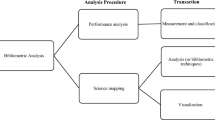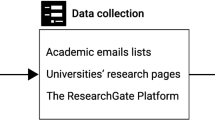Abstract
Quality in Higher Education Institutions is the subject of several debates in the academic community in a worldwide basis and various efforts are made towards identifying ways to quantify it. In this respect, the use of bibliometrics gains significant ground as an effective tool for the evaluation of universities’ research output. In the present study, the research performance of the seven Greek medical schools is assessed by means of widely accepted and advanced bibliometric indices, such as total and average publications and citations, average and median h- and g-index with and without self-citations for all the 1,803 academics, while statistical analysis of the data was also performed in order to compare the observed differences in the mean values of the calculated indices. Considerable effort was exerted to overcome all inherent limitations of a bibliometric analysis through a meticulous data collection. This large-scale work was conducted both in school and academic rank level leading to interesting results concerning the scientific activity of the medical schools studied as units and of the various academic ranks separately, which can be partially justified with geographic and socioeconomic criteria. In general, bibliometrics demonstrate statistically significant difference in favour of Crete University medical school, while it was also found that self-citations have only marginal effect on the individual’s research profile and the average indices. Finally, the useful findings of the present study render the methodology adopted of high viability for assessing the research performance of Higher Education Institutions even in a broader context.



Similar content being viewed by others
References
Abramo, G., & D’Angelo, C. A. (2011). Evaluating research: From informed peer review to bibliometrics. Scientometrics, 87(3), 499–514.
Aksnes, D. W. (2003). A macro study of self-citation. Scientometrics, 56(2), 235–246.
Aksnes, D. W. (2009). The use of bibliometric indicators in research evaluations in Norway. In 14th Nordic workshop on bibliometrics and research policy, Stockholm, Norway, 29–30 September.
Altanopoulou, P., Dontsidou, M., & Tselios, N. (2012). Evaluation of ninety-three major Greek university departments using Google Scholar. Quality in Higher Education, 18(1), 111–137.
Bach, J. -F., Jerome, D., Bony, J. -M., Braunstein, P., Cesarsky, C., Dalibard, J., Dumas, C., Friedel, J., Ghys, E., Le Moal, M., Meunier, B., Pironneau, O., Sentenac, A., Valleron, A. -J., Filliatreau, G., Glorieux, P., Jensen, P., Kahn, A., Lemercier, C., Linnemer, L., Weber, F., Adams, J., Friend, R., d’Artemare, B. (2011). On the proper use of bibliometrics to evaluate individual researchers. Institute of France, Report of the Academy of Sciences. http://www.academie-sciences.fr/activite/rapport/avis170111gb.pdf. Accessed 5 February 2013.
Bakkalbasi, N., Bauer, K., Glover, J., & Wang, L. (2006). Three options for citation tracking: Google Scholar, Scopus and Web of Science. Biomedical Digital Libraries, 3, 7.
Bar-Ilan, J. (2008). Which h-index? A comparison of WoS, Scopus and Google Scholar. Scientometrics, 74(2), 257–271.
Bartneck, C., & Kokkelmans, S. (2011). Detecting h-index manipulation through self-citation analysis. Scientometrics, 87(1), 85–98.
Beveridge, C., & Morris, S. (2007). Order of merit. Nature, 448(7152), 508.
Costas, R., & Bordons, M. (2011). Do age and professional rank influence the order of authorship in scientific publications? Some evidence from a micro-level perspective. Scientometrics, 88(1), 145–161.
Egghe, L. (2006). Theory and practise of the g-index. Scientometrics, 69(1), 131–152.
Frazer, M. (1994). Quality in higher education: an international perspective. In D. Green (Ed.), What is quality in higher education? (pp. 107–117). Buckingham: SRHE and Open University Press.
Garcia-Aracil, A., & Palomares-Montero, D. (2010). Examining benchmark indicator systems for the evaluation of higher education institutions. Higher Education, 60(2), 217–234.
Hirsch, J. E. (2005). An index to quantify an individual’s scientific research output. Proceedings of the National Academy of Sciences of the United States of America, 102(46), 16569–16572.
Hsu, J. C. (1996). Multiple comparisons—Theory and methods. London: Chapman & Hall.
Huang, M. H., & Lin, W. Y. C. (2011). Probing the effect of author self-citations on h index: A case study of environmental engineering. Journal of Information Science, 37(5), 453–461.
Katsaros, D., Matsoukas, V., Manolopoulos, Y. (2008). Evaluating Greek departments of computer science & engineering using bibliometric indices. In Proceedings of the Panhellenic conference on informatics (PCI), Samos Island, Greece, August 28–30, 93–102.
Lagrosen, S., Seyyed-Hashemi, R., & Leitner, M. (2004). Examination of the dimensions of quality in higher education. Quality Assurance in Education, 12(2), 61–69.
Lazaridis, Th. (2010). Ranking university departments using the mean h-index. Scientometrics, 82(2), 211–216.
Martin, B. R. (1996). The use of multiple indicators in the assessment of basic research. Scientometrics, 36(3), 343–362.
May, R. M. (1997). The scientific wealth of nations. Science, 275(5301), 793–796.
Rad, A. E., Shahgholi, L., & Kallmes, D. (2012). Impact of self-citation on the H index in the field of academic radiology. Academic Radiology, 19(4), 455–457.
Scheffe, H. (1959). The analysis of variance. New York: Wiley.
Shapiro, D. W., Wenger, N., & Shapiro, M. F. (1994). The contributions of authors to multiauthored biomedical research papers. Journal of American Medical Association, 271(6), 438–442.
Sypsa, V., & Hatzakis, A. (2009). Assessing the impact of biomedical research in academic institutions of disparate sizes. BMC Medical Research Methodology, 9, 33.
Sypsa, V., Petrodaskalaki, M., Hatzakis, A., Hatzakis, A. (2008). Assesing the research output of 219 European academic medical institutions (AMIs): Short report. Greece: Department of Hygiene and Epidemiology, Athens University Medical School. http://195.134.113.71/hygiene/images/evaluation.pdf. Accessed 1 February 2013.
Vaxevanidis, N. M., Despotidi, H., Prokopiou, H., & Koutsomichalis, A. (2011). On the evaluation of the quality of research in Greek HEIs using bibliometric indices. International Journal for Quality Research, 5(4), 247–254.
Vinkler, P. (2007). Eminence of scientists in the light of the h-index and other scientometric indicators. Journal of Information Science, 33(4), 481–491.
Zachos, G. (1991). Research output evaluation of two university departments in Greece with the use of bibliometric indicators. Scientometrics, 21(2), 195–221.
Author information
Authors and Affiliations
Corresponding author
Rights and permissions
About this article
Cite this article
Kazakis, N.A., Diamantidis, A.D., Fragidis, L.L. et al. Evaluating the research performance of the Greek medical schools using bibliometrics. Scientometrics 98, 1367–1384 (2014). https://doi.org/10.1007/s11192-013-1049-x
Received:
Published:
Issue Date:
DOI: https://doi.org/10.1007/s11192-013-1049-x




